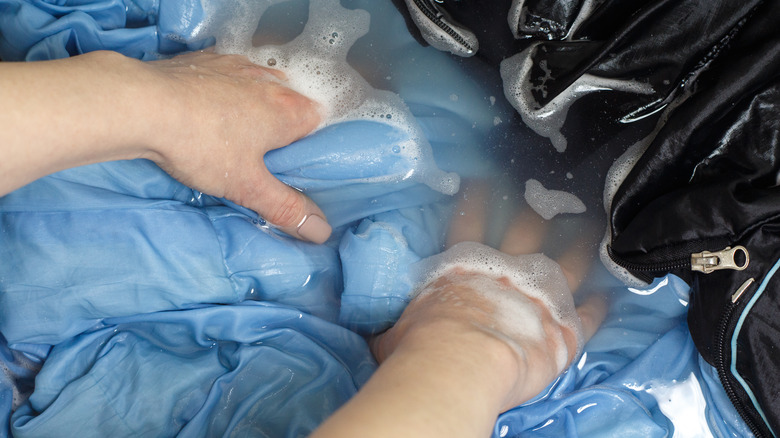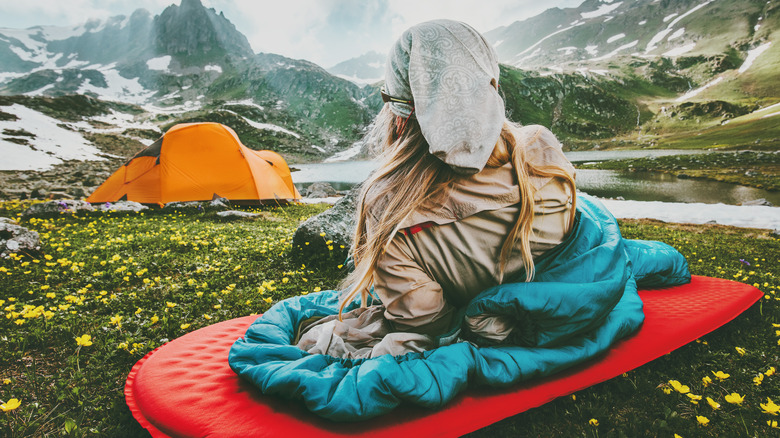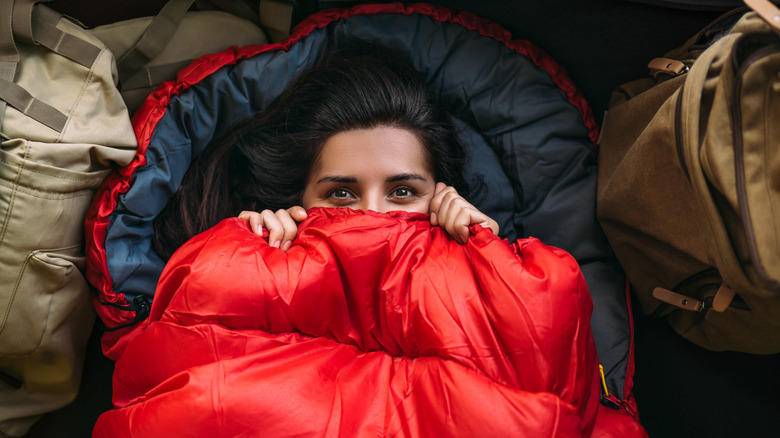Travel Guides Outdoor Adventures Camping
Laura Jones
If you’re anything like us, we’re going to go ahead and answer that question for you right now: No! Washing your sleeping bag is often forgotten at the end of a camping or backpacking trip. You launder your clothes, wash your kitchenware, rinse your tent — and your sleeping bag usually just gets stashed in a closet, waiting for the next outing. After all, if it doesn’t look dirty, it doesn’t need cleaning, right?
Many Redditors in the r/camping forum share this sentiment. When a user asked how often they should be washing their sleeping bag, there was a chorus of “You wash your sleeping bag?!” and two people mentioned it had been over a decade! So don’t worry: If you don’t wash your bag, you’re in good — if not slightly stinky — company.
Ultimately, our sleeping bags absorb a lot of our outdoor adventures, so we need to wash them. This is going to get a little gross, so brace yourself. Firstly, our bodies are pretty talented at producing oil and sweat. These can seep into the bag’s fibers, reducing its insulating properties. Dust and dirt find their way inside, too, especially if you don’t have access to a shower. And if you ever snack inside your cocoon (hopefully you don’t do this in bear country), those crumbs invite tiny critters and can provide fertile breeding grounds for bacteria. To combat all of this, experts say you should wash your sleeping bag at least once every hiking season.
Washing your sleeping bag

JoyNik/Shutterstock
Once every hiking season is a bit vague, though, right? As a rule of thumb, if your sleeping bag is dirty, starts to smell, or is losing its fluffiness, it’s time to wash it. Gear website Evo recommends washing your bag after every 20 days you sleep in it. However, you shouldn’t wash your bag too often, as this can reduce its lifespan.
Wondering about how to wash your bag? Always begin by checking the instructions on the label. Generally, you can wash down and synthetic sleeping bags in a machine, so there’s no need to handwash. Put your sleeping bag in a front-loading washer, and then tumble dry it with a few tennis balls in the drum to help restore its fluffiness. Several Reddit users in the r/camping forum recommend taking your sleeping bag to a laundromat and using the larger washers and dryers there.
If you want to handwash your bag, do it in the bath in cool water. Rinse several times to make sure all of the soap is out. To dry the bag, lay it flat or hang it on a line out of direct sunlight.
Ways to keep your bag clean

everst/Shutterstock
Other than washing, there are several ways to keep your sleeping bag clean. First, a spot clean will do if you’ve spilled something on it. Put soapy water on the dirty spot and then gently rub it with a cloth or soft toothbrush. Hanging your sleeping bag outside is also a favorite tip among campers. This is a great idea to freshen up your bag in between washes.
There are several ways you can keep your bag cleaner, too. First, no sleeping naked. Put a layer of clothes between yourself and your sleeping bag to keep some dirt from transferring. Sleeping bag liners also come highly recommended. Liners not only help keep your sleeping bag clean, but they can also provide some extra warmth. Finally, and this should be obvious, to stop your bag from getting dirty, don’t sleep directly on the dirt. Use a mattress or sleeping pad between your bag and the ground.

